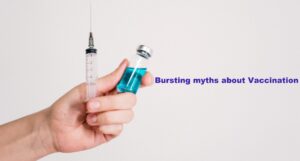
The vaccinations are the safety net which gives assurance to parents about the well-being of their child. Having worked with Life-Science domain, I had basic understanding of the safety testing that a vaccine goes through during its life cycle. But anti-vaccine groups have been debating about the possible connection between vaccinations and prevalence of developmental disorders for a long time. And, its time we burst these myths!
-
Myth 1 – MMR vaccinations can be the cause of the Autism Spectrum Disorder in children.
Truth – During mid-1990s, a medical investigative team led by A Wakefield postulated that the MMR vaccine(measles-mumps-rubella) may be cause for the development of autism spectrum disorder in children.
Multiple studies have proven that there is no correlation between the vaccines and the increase of autism spectrum in children. Five cohort studies involving 1,256,407 children, and five case-control studies involving 9,920 children were included in this analysis. The cohort data revealed no relationship between vaccination and autism.[1]
Even studies in UK confirmed that the rate of regressive autism in the United Kingdom was similar pre-MMR and post-MMR introduction in 1988.

-
Myth 2 – Mercury based vaccinations can cause developmental disorders in children.
Truth – Thimerosal is a mercury-based compound added in multiple vial dosage vaccinations to prevent bacterial growth. Low dose thimerosal exposure in humans has not been demonstrated to be associated with effects on the nervous system & it does not result in mercury levels that can cause toxic response.[2]
It is not linked to any pathophysiological changes known to be associated with autism.
-
Myth 3 – Number of antigens in early childhood vaccines can cause neuropsychological outcomes at age 7-10 years.
Truth – The growing children are exposed to many foreign antigens each day. For example, a case of upper respiratory viral infection an expose a child to 4-10 antigens. Multiple studies have been done to prove that multiple dosage in a single visit are effective and do not cause any long-term side effects. As a parent, I find multiple dosage in a single sitting to be beneficial. It means lesser shots required by my kid and also reduces the cost incurred during each visit.
From a study [3] including standardized tests to 1,107 children ages 7-10 years. It was concluded that there is no impact on following factors –
- Domain-specific neuropsychological outcomes
- General intellectual function
- Speech and languag
- Verbal memory
- Attention and executive function
- Tics
- Achievement
- Visual spatial ability
- Behavior regulation
As a parent, we want to keep our children safe and there is no harm in asking questions about the vaccinations that your child receives. The more you research, better informed decisions you will make.
What’s #YourCareQuotient? How much do you understand your child when it comes to sleep patterns, feeding and vaccination? Take the easy, interactive quiz that guides you and get the childcare guide now.
Disclaimer – The post has been written after exhaustive research but should not be treated a medical device. For any doubts regarding your child’s health, it is advisable to connect with your paediatrician.
References –
[1] https://www.ncbi.nlm.nih.gov/pubmed/24814559
[2] https://www.ncbi.nlm.nih.gov/pmc/articles/PMC2796520/#b48-pch07623




